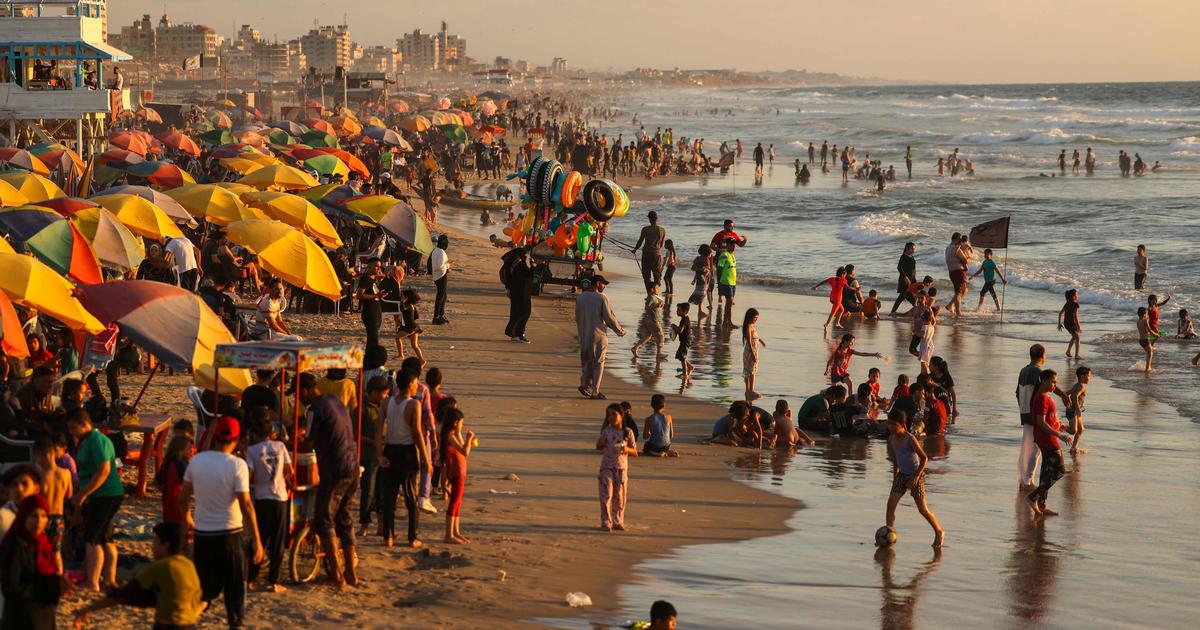In the Gaza Strip, it is the first summer in seven years when you can swim on the shores of the Mediterranean Sea.
Thanks to two new wastewater treatment plants installed at the end of 2021, marine pollution has been drastically reduced.
Over its 41km long, Gaza discharged 108 million liters of dirty water per day, making its coasts inaccessible.
Now, 65% of the coastline is classified as a “
yellow zone
” or “
green zone
” by the Palestinian Ministry of the Environment and can therefore accommodate swimmers.
After fifteen years of blockade by Israel and Egypt, the water crisis in Gaza has reached its climax since the last tensions.
To date, almost 97% of the aquifer (pocket of groundwater) is no longer drinkable due to the lack of maintenance of the treatment plants.
This environmental problem does not stop at the border since the spills also have an impact on the major cities of southern Israel, Ashkelon and Ashdod, as well as their desalination plants.
For Gidon Bromberg, co-director of the Israeli branch of EcoPeace Middle East contacted by
Le Figaro,
this progress "
is the first good news in Gaza for decades
".
With this trinational association, working for more than 30 years on environmental reconciliation processes in the Middle East, “
I think we have forced politicians to get their heads out of the sand
,” he says.
Read alsoGaza: Israel hits a Hamas position after a shot from the Palestinian enclave
“Water is held hostage”
Like all questions related to the Palestinian territory, the theme of water is subject to the Oslo agreements signed in 1993 by the two parties.
But since then, “
water is no longer a zero-sum game
,” says Gidon Bromberg.
Advances in technology have allowed greater independence from nature reserves, reducing the stakes.
In Israel, “
70% of drinking water comes from water desalination and 50% of agriculture depends on recycled water
”.
However, the negotiation principles of the agreement prevent any rapid progress: either the two parties agree on everything, or on nothing.
For Gidon Bromberg, “
water is taken hostage
” and therefore removed from priorities.
The blockade has also had a strong impact on the health crisis.
Concerned about the security of the territory, the Israeli army drastically limited deliveries of cement to the Gaza Strip, used by Hamas to build tunnels to the Jewish state.
At the same time, Fatah (Palestinian Authority of Mahmoud Abbas) stopped paying the electricity bills of Hamas (in power in Gaza), leading to repeated cuts.
Under these conditions, Gidon Bromberg explains that it is difficult to “
understand the meaning of security not only from a military point of view, but also from a human point of view
”.
Despite everything, “
Israelis and Palestinians are completely dependent on each other when it comes to the environment
,” he recalls.
Read alsoIsrael increases the number of entry permits to its territory for Palestinians from Gaza
A restored level of security
Thanks to the new power plants, pollution is at its lowest in years.
"
This is the first time in nearly a decade that Gazans and Israelis in the south can operate with a much higher level of security
," Gidon Bromberg said.
Without evolution, nearly 15% of Israeli water production would be at risk, and the environmental disaster would increase tenfold.
"
It's a groundbreaking example of how environmental cooperation brings mutual benefits and from our feedback, residents on both sides are happy
," he said.
Read alsoIn Gaza under blockade, 4 out of 5 young people suffer from emotional distress
Gidon Bromberg also emphasizes the importance of international cooperation, without which depollution plans cannot be possible.
In total, 250 million euros of investment were necessary and are mostly European.
During his last visit, “
Europe showed great interest in our
Green Blue Deal
.
Ursula von der Leyen, along with myself and my Palestinian co-directors, showed a particular interest in it
, he says.
I'm sure it will be resolved, it remains to be seen what price we will pay until we get there
.
The next turning point is expected in November at the Egyptian COP27 in Sharm el-Sheikh, when the Mediterranean environmental crisis is in full swing.

